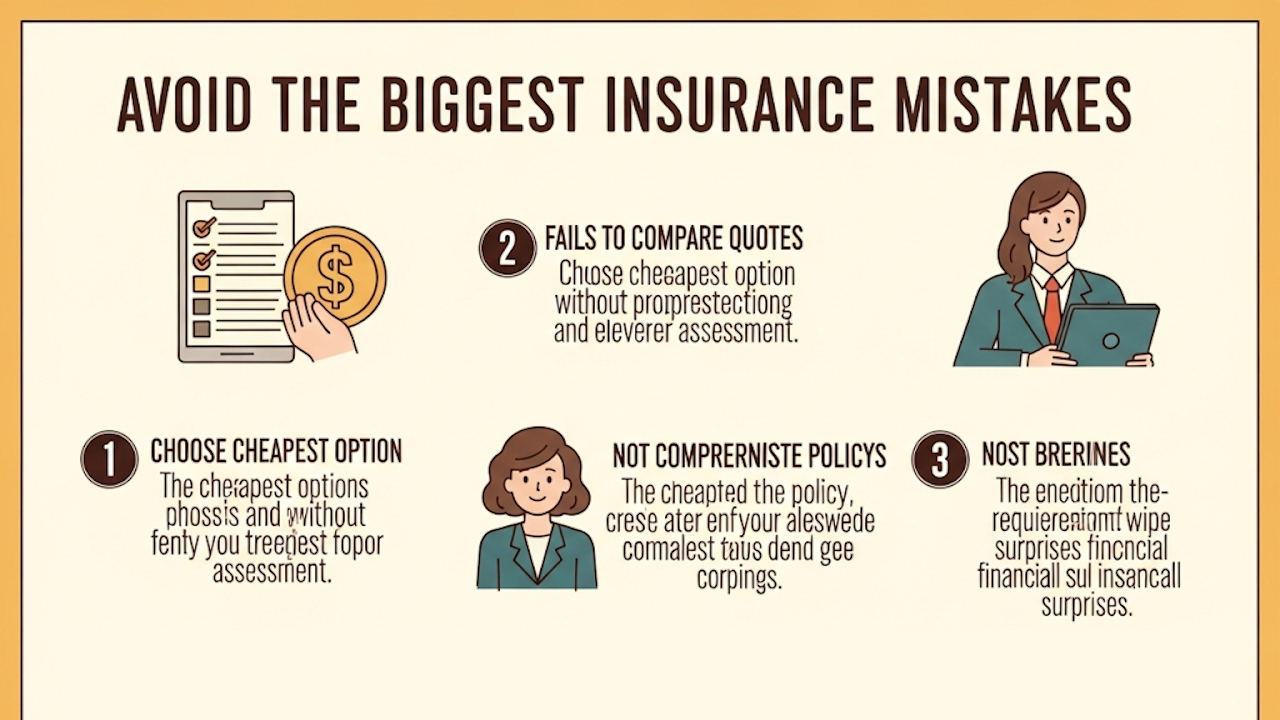Choosing the right insurance policy is one of the most important financial decisions people make. Whether it is health, auto, home, or life insurance, the wrong choice can have long-term consequences. Despite the significance of these decisions, many people fall into common traps when selecting their coverage. These mistakes can lead to inadequate protection, higher costs, or both. Understanding the pitfalls can help consumers make smarter, more informed choices.
1. Focusing Only on Price
One of the most common mistakes is choosing a policy based solely on the monthly premium. While it is understandable to want to save money, a low premium often means higher deductibles or limited coverage. People frequently overlook what the policy actually includes. If a major event occurs, such as a serious illness or a car accident, the cheaper policy might end up costing much more in out-of-pocket expenses. Instead of zeroing in on price alone, it’s crucial to balance cost with the scope of coverage and long-term value.
2. Not Reading the Fine Print
Insurance policies are notorious for complex language and fine print. Many people skim through the documents or skip them entirely, assuming they understand the basics. This is risky. Important details such as exclusions, coverage limits, waiting periods, and conditions for payout are often buried in the policy. Ignorance of these terms can result in denied claims or unexpected costs. It is always worth taking the time to read and understand every part of the policy or to consult an expert who can explain it clearly.
3. Underinsuring or Overinsuring
People often either underestimate or overestimate how much coverage they need. Underinsurance can leave a person vulnerable if a serious event occurs. For example, a homeowner who insures their property for less than its replacement cost may be stuck with huge out-of-pocket expenses after a fire or natural disaster. On the flip side, overinsuring can be a waste of money, with premiums being paid for coverage that is unnecessary. Getting a professional evaluation of your needs can help ensure you are neither underprotected nor overpaying.
4. Ignoring the Reputation of the Insurance Provider
Not all insurance companies are created equal. Some have a reputation for poor customer service, delayed claims processing, or low claim approval rates. Failing to research the insurer’s history and customer reviews can lead to frustration and financial loss down the line. It’s important to choose an insurance company with a solid track record, clear communication, and responsive claims service. Looking at third-party reviews, financial strength ratings, and customer testimonials can provide valuable insight.
5. Forgetting to Update the Policy
Life changes often, and insurance needs change with it. Getting married, having children, buying a home, starting a business, or retiring all affect the type and amount of insurance coverage you may need. One common mistake is failing to review and update insurance policies regularly. What worked five years ago might no longer be relevant. Setting a calendar reminder to revisit all insurance policies annually ensures your coverage keeps up with your current life circumstances.
6. Overlooking Discounts and Bundling Options
Many people miss out on available discounts simply because they do not ask or do not know they exist. Insurance companies frequently offer reduced rates for bundling multiple policies, having a good driving record, installing home security systems, or living a healthy lifestyle. These discounts can significantly reduce your premium. Taking the time to ask about savings opportunities or comparing bundled quotes can make a noticeable difference in annual insurance costs.
7. Choosing the Wrong Deductible
The deductible is the amount you pay out of pocket before your insurance kicks in. Choosing a very low deductible might sound appealing because it limits upfront expenses after a claim, but it also increases the monthly premium. On the other hand, selecting a high deductible to lower your premium could be risky if you don’t have enough savings to cover it when needed. The key is to strike a balance between what you can afford monthly and what you could realistically cover in an emergency.
8. Not Asking Enough Questions
Many consumers are hesitant to ask their insurance agents or brokers detailed questions, fearing they might appear ignorant. This reluctance can lead to misunderstandings and the selection of a plan that does not meet their needs. A good insurance agent should be willing to explain all aspects of a policy in plain language. Asking questions about scenarios, exclusions, benefits, and claim processes can help clarify what you are signing up for and help you avoid surprises later.
9. Assuming Employer-Provided Coverage is Enough
Relying solely on insurance provided by an employer is another common oversight. While employer-sponsored plans can be a great benefit, they often have limitations. For example, group life insurance usually offers a death benefit that is only one or two times your annual salary, which might not be sufficient for your family’s needs. It’s also risky to depend entirely on a policy that is tied to your employment, since losing your job typically means losing the coverage. Supplementing employer coverage with individual plans can provide better protection.
10. Not Comparing Enough Options
Insurance is a competitive market, but many people fail to shop around. They might go with the first company they talk to or stick with a familiar name without doing comparisons. Comparing quotes and policies from several insurers can reveal better deals or more suitable coverage. Online comparison tools, independent brokers, and financial advisors can all help broaden your view and ensure you’re not missing a better opportunity elsewhere.
In conclusion, choosing the right insurance policy requires time, research, and thoughtful consideration. Avoiding these common mistakes can make the difference between being well protected and being caught off guard. By taking a proactive and informed approach, you can ensure that your insurance decisions support your financial well-being and give you peace of mind.

